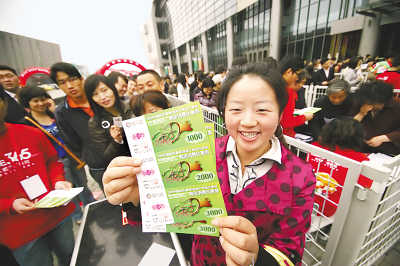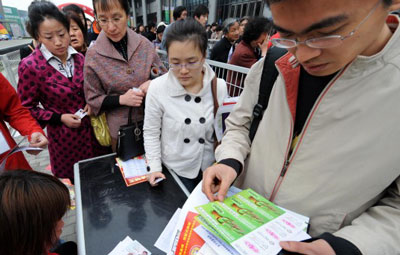The distribution of 40,000 free housing vouchers worth a total of 240 million yuan (US$35.1?million) ?to local residents at a Nanjing real estate fair has sparked controversy in the city, the capital of East China's Jiangsu Province.
Long queues outside the exhibition hall
Locals waited patiently in six long queues outside the Nanjing Spring Real Estate Trade Fair on April 16 hoping to lay their hands on one of 40, 000 sets of free housing worth a total of 240 million yuan that were to be distributed by the organizers. Staff said people started arriving at 8 am and most were still queuing at 11 am.
The vouchers were distributed by the Organizing Committee of the Nanjing Spring Real Estate Trade Fair – an event sponsored by the local government.
Each citizen with a valid ID card was entitled to two sets of housing vouchers worth a total of 12, 000 yuan.
60 year-old Yang Zhongliang arrived early at the distribution point with his wife. "We found two apartment blocks that would be suitable for our son to live in," he said. "When we found out that both accept housing vouchers, we decided to come here to queue up."
|

|
|
A resident shows off housing vouchers she received at the Nanjing Spring Real Estate Trade Fair on April 16. [People's Daily] |
More vouchers than buyers
Although each citizen was allowed 12, 000 yuan in housing vouchers, most real estate agencies would only accept only 3, 000 to 5, 000 yuan, or even 1, 000 to 2, 000 yuan on a purchase. So only those in the market for properties priced at a million yuan or more were able to use the full value of their vouchers.
Neverthless, the Organizing Committee said it was confident the vouchers would stimulate sales. The director said that if 5,000 sets of housing vouchers were used, they would generate 4 billion yuan in housing sales.
But in fact, many residents didn't use the vouchers they received.
"I don't know how much the housing vouchers will help," said Yang Zhongliang.
"If I save 2, 000 to 3, 000 yuan on a house that costs hundreds of thousands of yuan it makes very little difference," said Zhang Daxin, a resident from Jianye District. But Yang Zhongliang and his wife maintained that anything is better than nothing.
Lu Yingxi, Associate Research Fellow at Nanjing University of Finance and Economics, said housing vouchers were effectively a way for real estate firms to offer discounts. High discounts will drive sales, he said, but if the discount is as low as one or two percent, the measure will have little effect. Many other experts also took a dim view of the usefulness of the vouchers.
Voucher distribution versus price reductions
The Nanjing Real Estate Administrative Bureau claimed that the distribution of housing vouchers was an initiative of the market not the government, despite the fact that the local government was the driving force behind the real estate fair.
According to the Bureau, the vouchers are a way for the real estate business to share its profits with house purchasers and the practice of distributing housing vouchers should be encouraged. "We would like to see more transfer of profits from real estate businesses to house buyers."
The Organizing Committee of the real estate fair said their aim was to help ordinary people save money. A committee source said they had bargained with real estate businesses on behalf of house-buyers.
Many residents asked if real estate businesses were so keen to share its profits, why they didn't just reduce prices instead of distributing vouchers but the organizers maintained the vouchers were an additional discount over and above normal discounts offered by the real estate agents.
But according to Professor Ge Yang from School of Business, Nanjing University, the housing vouchers were in fact equivalent to a price reduction. It was a transfer of profits from the developers to buyers rather than a government subsidy. And since the real estate market has recently showed signs of improvement, developers and readl estate companies see vouchers as a more useful sales promotion than direct price cuts.
|

|
|
A Nanjing resident examines housing vouchers he has just received at a Nanjing real estate fair. [Xinhua] |
Will governments distribute housing vouchers?
Yang Zhonglilang finally managed to use 10, 000 yuan in vouchers to help with his purchase. "The housing vouchers saved us a lot," he said. "But it would be better if the government helped us in some way."
Recently, some local governments have distributed vouchers to help with the puchase of consumer goods. Is it possible that some may go further and issue housing vouchers? Most experts think it unlikely.
According to Lu Yingxi, when the government distributes vouchers it aims to offset inequalities in income distribution. So any government housing aid should be offered to people on low-incomes in the form of low-rent housing. It would not make sense for the government to distribute house purchase vouchers, since house buyers are relatively well-off.
Ge Yang said government distribution of housing vouchers would be against the interests of the majority of taxpayers. "It is unfair to spend the money of all taxpayers to subsidize the real estate business," he said.
Professor Liu Dong from the Economics Department of Nanjing University said the government should distribute consumption vouchers to all citizens. She said vouchers should not be restricted to particular types of purchases. Instead, consumers should be free to decide how to spend them. In this case consumers could decide to use some of the vouchers on house purchases.
But the Origanizing Committee of the real estate fair said government distribution of housing vouchers would not work. Unlike, for example, tourism vouchers, housing vouchers would have to represent a huge sums to make a difference to spending patterns, and the government simply cannot afford to give away tens of thousands of yuan to each citizen.
(China.org.cn by Li Xiao, April 21, 2009)